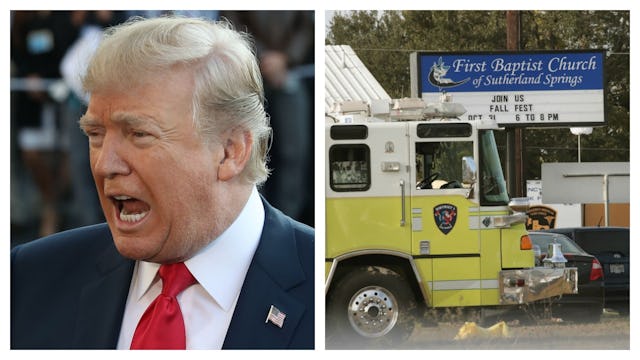Please Remember That Mental Illness Is NOT Typically Linked To Violent Crime

As I readied for my daughter for school this morning, I did what I do most mornings: I turned on my laptop and checked the news. Of course, I knew what I would find: Yesterday was a horrendous day in American history, and the headlines reflected that. Almost every news story was about the one-man massacre in Sutherland Springs, Texas, which took the lives of 26 churchgoers and injured countless others.
But what I didn’t expect to find were ignorant, dangerous, and misguided headlines about mental health.
Headlines spurred by ignorant, dangerous, and misguided comments from President Donald Trump. You see, early Monday morning President Trump said the current problem in our country isn’t a gun problem, it is a “mental health problem.” The favorite go-to line for rabid gun enthusiasts who typically pledge allegiance to the NRA and the GOP.
“Mental health is your problem here,” Trump said. The shooter was “a very deranged individual” and that is the problem. “This isn’t a guns situation. This is a mental health problem at the highest level…[at least] that’s the way I view it.”
Here we go again. For fuck’s sake.
Don’t buy into this, because Trump is not concerned with this violence being a “mental health problem at the highest level.” If he truly believed this, then why did he revoke the Obama administration’s gun checks for people with mental illness? It’s smoke and mirrors, folks.
What you have here is another one of Trump’s ill-informed opinions. Luckily, opinions aren’t facts and President Trump is wrong.
Very wrong. These are “alternative facts.” But people are quick to jump on this bandwagon with him, and that’s dangerous.
Make no mistake: There are criminals who struggle with mental illness. However, according to the U.S. Department of Health and Human Services, the vast majority of people with mental health problems are “no more likely to be violent than anyone else.” In fact, “only 3%–5% of violent acts can be attributed to individuals living with a serious mental illness.” Furthermore, “people with severe mental illnesses are over 10 times more likely to be victims of [a] violent crime than the general population.”
That’s right. People with mental health concerns are more likely to be a victim of violence than a perpetrator.
And while I am a huge proponent of comprehensive mental health care, I am a patient first and an advocate second, one who strongly believes proper screenings and care are of the utmost importance — the discussion we should be having today isn’t about mental illness because falling back on “crazy” as an excuse for acts of violence isn’t just inaccurate, it is dangerous. It is stigmatizing. It is detrimental to the entire mental health community, and it is a copout.
It also allows both policymakers and the general public to ignore the bigger, more complicated issues at hand: issues of accessibility, accountability, and gun reform.
Of course, this response is nothing new. Every time there is a mass shooting — every freakin’ time — articles pop up questioning the shooter’s mental state, and people hypothesize as to what sort of derangement he (or she) may have been suffering from. And I get it. Sort of. I mean, how could someone of a sane mind commit such a heinous act, so cold and callous and seemingly without remorse?
But just because we do not understand a criminal’s mind does not mean it is a “sick” mind. It does not mean that it is a “psychotic/schizophrenic/bipolar/insert other mental illness here” mind. It is a criminal’s mind, and according to Jonathan Metzl, a professor of psychiatry, sociology, and medicine, health, and society at Vanderbilt University, there is more to that mind than mental illness: While some mass shooters may exhibit “psychiatric or psychological symptoms […] there are a lot of other factors that aren’t linked to mental illness that are equally predictive if not more predictive, [including] access to firearms, substance use or abuse, and past history of violence or arrests.”
And while I do not know the mental state of the Texas shooters, I do know the man was a murderer. He was a terrorist. A violent criminal hell-bent on causing pain, death, and destruction.
So, please, watch your words, President Trump. And please everyone else, be careful of the rhetoric you subscribe to.
As Mental Health America said in a recently released statement, “If leaders of our country are sincerely interested in fixing our mental health system, they need to show it now.”
I know we are all angry, scared, and sad, but be mindful of your words and remember that if there is something you want to talk about today — if there is something you want to bitch or vent or do about these tragedies — how about asking why we sell the average American citizen assault rifles? Why are semiautomatic weapons legal? And why are the limitations on gun and ammo sales so lax? What happened to comprehensive background checks? What about the loopholes?
The real problem is that no one needs access to an assault rifle, and we need gun control reform ASAP.
This article was originally published on